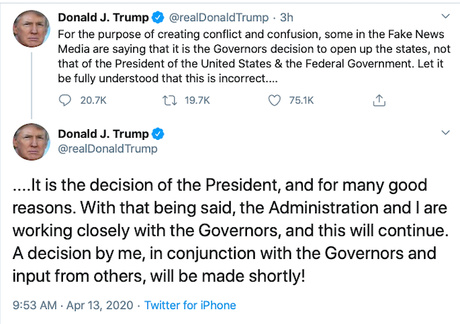
Donald Trump knows he has screwed up the U.S. response to the Coronavirus pandemic (whether he wants to admits it or not). And he knows that the economic effect of his mistakes has put his re-election in danger. That's why he wants to reopen the businesses as quickly as possible -- in the hope that the economy will rebound quickly and make him look good. He is currently considering ordering the reopening of businesses by May 1st.
There are several things wrong with that.
First, even if he is able to reopen the economy, there is not going to be the quick rebound he is hoping for. Some (maybe many) businesses will not reopen at all. They were barely hanging on, and the shut-down will kill them.
Second, most people will be slow to put themselves in store crowds -- afraid they could catch the virus (which will be around for months).
Third, ending the stay-at-home orders too soon would likely give the Coronavirus a new life -- causing many new cases and deaths, and resulting in a new shut-down order (which would be even worse for the economy).
Fourth (and perhaps most important), he does not have the authority to order an end to the stay-at-home orders and business shut-downs ordered by the states. He is trying to seize a power that he does not have under the Constitution. The orders were issued by the governors in each states, and they are the only ones with the power to undo those orders.
Consider this from USA Today:
Federal law allows Washington to impose quarantines in some circumstances and limit travel between states, but the Trump administration has not invoked those powers. And the Supreme Court has struck down attempts by the federal government to intervene within states. For instance, the court noted in a 1985 decision that invalidated Food and Drug Administration rules for blood plasma donation centers that "the regulation of health and safety matters is primarily and historically a matter of local concern."
"First and foremost, states currently retain power to decide who stays home and for how long," according to an analysis for Lawfare. "Among the powers generally reserved to the states is the authority to quarantine individuals and otherwise protect public health."

